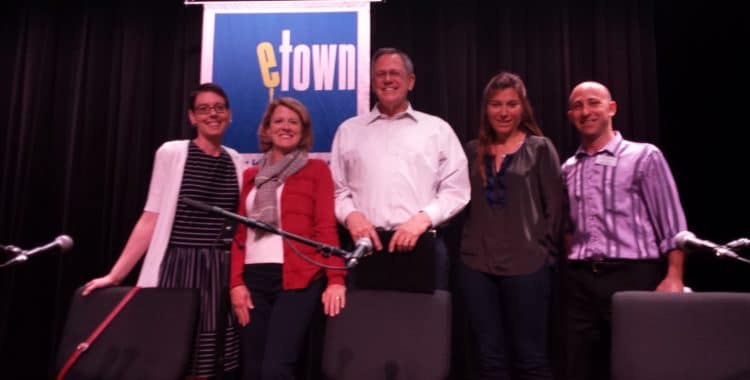


Thursday, May 29th, 2014
By Julie Simmons, SVP Spring 2014 Community Outreach Intern

SVP Boulder County was proud to host a panel of nonprofit social enterprises during 2014’s Boulder Startup Week. SVP Executive Director Jennie Arbogash moderated a panel that showcased some of Boulder County’s brightest nonprofit entrepreneurs, including Bridge House’s Isabel McDevitt, Dental Aid’s Dennis Lewis, Center for Resource Conservation’s Michelle Barnes, and Intercambio’s Lee Shainis.
To kick off the conversation, Jennie set the stage sharing the Social Enterprise Alliance’s definition of a social enterprise: “businesses whose primary purpose is the common good.” Jennie reminded the audience of some of the more well-known businesses that are social enterprises or employ a social enterprise model, such as Goodwill, L.A. Kitchen, and the Boulder Farmer’s Market. She pointed out that most people have either participated in or have patronized a nonprofit social enterprise without even realizing it, and that social enterprises are simpler and more common that we typically think.
Isabel began by talking about the two social enterprises run out of Bridge House, Ready to Work and Community 

Dennis explained Dental Aid’s model – where the costs of dental care are spread among patients who are able to pay and those who
Michelle pointed out that the Center for ReSource Conservation (CRC) has been a social enterprise since before 
When Lee and his partner started Intercambio as a way to help immigrants integrate and thrive in our community by teaching English, American culture, and life skills, they didn’t consider it a social enterprise. With the success of their model and interest from other organizations, to help spread the Intercambio mission beyond  Boulder, they began publishing and selling the Intercambio Immigrant Guide as well as a complete English language program package. Selling these products has allowed Intercambio to further its local mission, while letting them partner with nearly 700 organizations nationally, helping immigrants learn to succeed in their new country.
Boulder, they began publishing and selling the Intercambio Immigrant Guide as well as a complete English language program package. Selling these products has allowed Intercambio to further its local mission, while letting them partner with nearly 700 organizations nationally, helping immigrants learn to succeed in their new country.
Some of my key takeaways from the 2014 Boulder Startup Week panel include:
(1) That a social enterprise must integrate with the mission of the nonprofit and must be both simple and sustainable. Simplicity is important because introducing a social enterprise model is inevitably going to change the culture of any nonprofit organization, and introducing a model that is easy for existing staff to understand and support will allow for a smoother transition.
(2) Public perception can also change when a nonprofit introduces a social enterprise model. Donors may not understand that a social enterprise usually does not replace traditional nonprofit funding sources, and continued donations and grants are usually still absolutely necessary for the health and sustainability of the nonprofit. However, social enterprise is an excellent way for nonprofit organizations to add some stable income to their funding sources.
(3) A sustainable source of profit requires that the social enterprise offer real value at a competitive price. Adding a social enterprise component is easier if a nonprofit is in a good financial situation to launch the program and strong board support is invaluable.
Nonprofit social enterprise is an important trend that will keep the nonprofit sector fresh and relevant as the economy fluctuates, and the business world changes. Also, business men and women looking to get involved in the nonprofit sector may find social enterprise to be a more familiar and comfortable avenue of transition.
SVP Boulder County will continue to encourage its investees to explore social enterprise ideas and, as Michelle of CRC put it, use social enterprise to “move Boulder County’s nonprofit sector from a position of funding scarcity to a position of income abundance”.